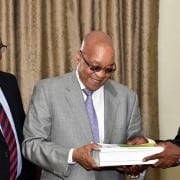|
Getting your Trinity Audio player ready...
|
 Whistleblower Richard Young was unable to cross-examine Armscor programme manager Frits Nortje because he does not have sufficient time and access to classified documents – this is one of the big concerns around the Seriti Commission, which is investigating “allegations of fraud, corruption, impropriety or irregularity in the strategic defence procurement package”.
Whistleblower Richard Young was unable to cross-examine Armscor programme manager Frits Nortje because he does not have sufficient time and access to classified documents – this is one of the big concerns around the Seriti Commission, which is investigating “allegations of fraud, corruption, impropriety or irregularity in the strategic defence procurement package”.
Lawyers for Human Rights have faced similar issues, as the commission refused to give them access to documents that would prove vital to uncovering the truth of the arms deal. Section three of the commission’s practical guidelines states that “documents to be used in evidence by a witness about to testify will be furnished ahead of the evidence”. Thus, interested parties, including Young and Lawyers for Human Rights, would have access to “such documents as are relevant to the issues raised in [witness] statements” that would allow them to cross-examine witnesses effectively.
However, in the case of classified documents, the commission makes special provision for them to be dealt with differently.
Andrew Feinstein has written extensively on the global arms trade – he has long held that arms deals all over the world are cloaked under a mantle of national security that allows acquisition documents to be classified. This seems to be the case in South Africa too.
But what does it mean to classify a document? Can members of the public gain access to classified documents, and do classified documents ever get declassified?
Access to information
Section 32 of the Constitution gives anyone the right to access information held by the state, or by another person, that is required to exercise or protect any constitutional right. The national legislation that gives effect to this right is the Promotion of Access to Information (PAIA) Act of 2002. PAIA aims to foster a culture of transparency and accountability in South Africa by promoting a society where people have sufficient information to exercise any and all rights. However, it does make special provision for matters of defence and security, stating that pubic bodies may refuse access to information if the disclosure poses a reasonable threat to the defence or security of the country.
Chapter four includes the types of information that would pose a potential threat to defence and security, such as:
- Information related to quantity, characteristics, capabilities and vulnerabilities of weapons and other equipment;
- information related to quantity, characteristics, capabilities and vulnerabilities of any weapons and other equipment that is currently being designed or developed.
Documents that contain this type of information are usually classified as restricted, secret, top secret or confidential, and would not be accessible to the public.
Documents are classified in accordance with the Protection of State Information Act of 1982 and the Minimum Information Security Standard (MISS) approved by Cabinet in 1996. MISS refers to “sensitive information which in the national interest, is held by, is produced in, or is under the control of the State, or which concerns the State and which must by reasons of its sensitive nature, be exempted from disclosure and must enjoy protection against compromise”.
Although the level of document classification differs according to the sensitivity of the information, MISS states that classified documents are only accessible to:
- Persons with the right security clearance;
- persons who need access to the document in order to execute their duties, assuming that they have the required security clearance;
- persons, such as secretaries or typists, who need access to the information on an ad-hoc basis owing to the circumstances, provided that they taken an oath or declaration of secrecy.
Documents are graded in terms of the level of sensitive information within. Whether a document should be classified, and the level of grading, is determined largely by the author of the document and the head of the institution from which the document originates.
Classified documents complicating cross-examination
Decisions regarding the declassification of documents are explained in PAIA, although MISS provides some clarity on this issue, stating that the the author, or head of the institution from which the document originates has the ability to declassify a document.
This is one of the areas which the new Protection of State Information Bill, commonly referred as the Secrecy Bill, aimed to address. The Secrecy Bill was first introduced into the National Assembly in 2011, and after a series of amendments was approved by the National Assembly in 2013. However, the president has not yet signed the bill into law, and has referred it back to the National Assembly, which means that it does not currently apply.
Since some of the arms deal documents, including the contract between Armscor and the equipment suppliers, remain classified, not all of the interested parties have access. This has hampered the ability of organisations like Lawyers for Human Rights to effectively cross-examine witnesses.
It means that we may not be able to get all the answers or the depth of understanding to put the allegations surrounding the arms deal to bed. There are other document-related issues, such as unrealistic demands placed by the Seriti Commission on people like Young to produce and submit documents pertaining to their cross-examination.
Furthermore, the commission has sometimes only provided witness testimony to interested parties on the morning of the witness’s appearance. As David Cote from Lawyers for Human Rights contends, “there’s an art to cross-examination”, and inadequate access renders them unable to cross-examine witnesses.







